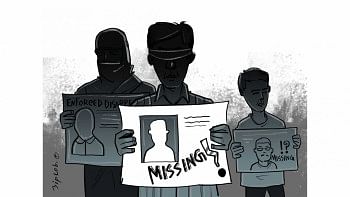Opekkha: A Long Wait in Uncertainty

Other than focusing on terrorism, the director tries to explore how a seemingly bright individual becomes the prey of an antisocial organisation.
A grandmother's monotonous days at her remote village is marked by counting moments to her only grandson's visit. The grandson, Raibul, lives in the city and harbours the ambition of becoming a singer. The grandmother's frustration turns into urgency, when she talks to someone visiting from the city, thinking that her grandson might know him. Her repeated requests to a neighbour to write a letter to Rabiul also indicates her yearning to see her only family member.
But fate has something else in store for Raibul's grandmother, who suffers a short term memory loss: she fails to recall that her beloved grandson died a few days ago in a terrorist bomb blast.
This is the opening sequence of Abu Sayeed's sixth feature film “Opekkha”. Although the first few minutes of the film circle around Rabiul and his grandmother, as the camera rolls it becomes apparent that Rabiul is not the protagonist; rather “Opekkha” is the story of his slayer Ranju, who transforms from a polite and gentle individual into the bomb-expert of a militant group. Nevertheless, Rabiul's shadowy presence remains till the end of the film.
Sayeed's film highlights the burning and sensitive contemporary issue of terrorism in the name of religion. Other than focusing on terrorism in a broader way, the director tries to explore how a seemingly bright individual like Ranju becomes the prey of an antisocial organisation. The filmmaker also strives to portray the after-effects of the bomb blast on the victim's family.
While, the film does not reveal how Ranju got acquainted with the militant group, it seems apparent that his blind belief in religion was the reason. When one of his comrades argues with the leader that terrorism or killing of innocent people is not the core aspect of their religion, Ranju demonstrates his indifference. Despite starting off as a rational individual, Ranju never disagrees with his leader.
Sayeed shot the film in digital format [his previous films are in 35mm] which does not produce the best output. In some scenes the images look hazy.
“Opekkha” also falls short in establishing the connection between the two main characters -- Rabiul and Ranju. It takes the viewer quite a long time to understand that Ranju is to be blamed for Rabiul's death. The story suddenly takes u-turn, when law enforcers show up at Ranju's home one night and inform the family about Ranju's role in Rabiul's death.
After the initial confusion, the film picks up and gets better. The film continues with two parallel stories, zooming in on Ranju and Rabiul.
Perhaps, the filmmaker decided to call the film “Opekkha” to denote a hope: waiting for a day when bright young individuals like Rabiul won't be victims of terrorist attacks, nor those with potentials like Ranju become parts of terrorist groups.
Sayeed also beautifully depicts another meaning of 'Opekkha' in his film, with Raibul's grandmother anxiously awaiting for his arrival and Ranju's parents waiting for their son. While the grandmother's wait remains in vain, Ranju's father becomes desperate to bring his son back from the dark world.
Neither the parents' nor the grandmother's wait ends, as the film leads the audience to an uncertain destination with no hope or prediction.
“Opekkha” was released on December 31, 2010 in Dhaka and Rajshahi. It features Tinu Karim, Ujjal Mahmud, Mirana Zaman and Jayanta Chattopadhyay in central roles. Sayeed has also written the story and script of the film.

 For all latest news, follow The Daily Star's Google News channel.
For all latest news, follow The Daily Star's Google News channel. 



Comments